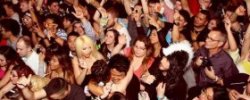 Feeling a little horse … Amy Lamé performs at Duckie.
Feeling a little horse … Amy Lamé performs at Duckie.
The clubbing world is fickle. Of course it is: it’s based on enormous irresponsibility and activities that half the people involved don’t even remember the day after they’ve happened. Running regular club nights needs incredible stamina and an ability to conjure order out of chaos that ordinary mortals can’t begin to understand. Minds and personalities have all too often been obliterated, if these qualities are faked or boosted with chemical enhancements for any length of time. In short it’s a messy, mad environment that is really not conducive to stability.
So when you find out that a club night is about to be put on for the 999th time in the same venue in which it’s always been put on, run by the same team that founded it exactly 20 years earlier, and that it hasn’t lost any of its vitality, it’s worth paying close attention to what its organisers are doing right.
Duckie was founded at the Royal Vauxhall Tavern in south London in 1995 for no other reason than to play “just the sort of pop records you don’t really hear anywhere else especially in ‘gay’ clubs”, according to Chelsea Kelsey, half of Duckie’s DJing duo, the Readers Wifes [sic]. The moody looking drag duo – who once described their aesthetic as “mardy sex threat” – delivered, then as now, a series of musical short sharp shocks, insisting on the primacy of the three-minute pop rush at high volume, and especially favouring “records with screaming”. Led Zeppelin, Suzi Quatro, Lee “Scratch” Perry and lashings of Kate Bush – along with any current pop records that had a taste of aggro or oddness – immediately attracted a rowdy and extraordinarily loyal crowd.
Duckie founders Jay Cloth, Chelsea Kelsey, Amy Lam0 and Kim Phaggs.The sharp shocks began before you get in off the street. Your welcome to Duckie came courtesy of “door artistes” Father Cloth and Jay Cloth and host Amy Lamé: ever-courteous but fearsome and as likely to turn away mega-celebrities unwilling to adhere to Duckie’s strictly egalitarian no-guestlist policy as they were hen parties or drug casualties. But just in case the faint-hearted or closed-minded weren’t put off by them or the heaving and riotous dancefloor, Duckie included a strong performance element with turns by frequently challenging performers: Blackpool cabaret monster David Hoyle aka The Divine David was an early and indicative ally, and it’s certainly not been uncommon over the years to have people on stage pulling or spraying things from unlikely orifices.
In many senses, nothing has changed at all in the two decades since the first bacchanal. As the other half of the Readers Wifes, Kim Phaggs, puts it: “I think the fact that the same six people that started it were there on the first night and were still there after all these years, and still having a carry-on every week is a pretty remarkable achievement.” Duckie has expanded in all directions, putting on art events, discussions, exhibitions and cabarets worldwide (it is now, its website notes, a “National Portfolio Organisation of Arts Council England”), but the RVT club night has remained its beating heart, a ritual of unpretentious lunacy that keeps its feet firmly on the sweaty, gunky floor. And the crowd has stayed along for the ride. Chelsea Kelsey describes “a sort of churn every few years of new kids – art students and young performers and all that – who mix brilliantly with the hardcore who’ve been coming years and growing old disgracefully with us.” The sense of family this engenders is something to behold, with Kim even having met his partner right at the start of the club: “He came down on the third ever Duckie, and naturally fell head over heels in love with me and were still together today.”
“Tell you what has changed, though, ” Chelsea says, “Vauxhall. It was terrifying when we started. We used to take a hammer with us because there were so many roughs about everywhere. Not like that now – there’s a Starbucks, a Sainsburys and MI6.” The Duckie crew are not luddites, but their sense of themselves as embedded within the ebb and flow of London’s history, and that of its gay subcultures, is crucial to their tenacity. Plenty of their productions outside the RVT, from Explosion! The Rock’n’Roll Ghosts of Soho to their yearly Gay Shame parties, celebrate and interrogate this. But it’s their real-world achievement in energising the campaign to get the RVT listed as a landmark of London’s nighttime history – a rare victory against the deluge of cultural erasure by gentrification – of which they are rightly most proud.

 A gay bar is a drinking establishment that caters to an exclusively or predominantly lesbian, gay, bisexual, and transgender (LGBT) clientele; the term gay is used as a broadly inclusive concept for LGBT and queer communities. Gay bars once served as the epicentre...
A gay bar is a drinking establishment that caters to an exclusively or predominantly lesbian, gay, bisexual, and transgender (LGBT) clientele; the term gay is used as a broadly inclusive concept for LGBT and queer communities. Gay bars once served as the epicentre...
 Heaven is a superclub in London, England which appeals predominantly (but not exclusively) to the gay market. It is located underneath Charing Cross railway station in Central London, just off Trafalgar Square.
Heaven is a superclub in London, England which appeals predominantly (but not exclusively) to the gay market. It is located underneath Charing Cross railway station in Central London, just off Trafalgar Square.





